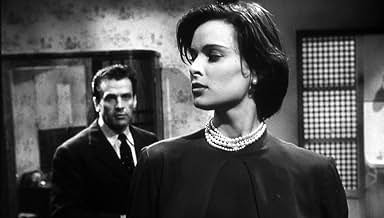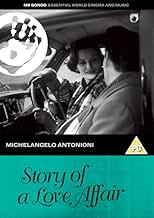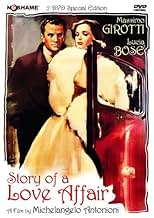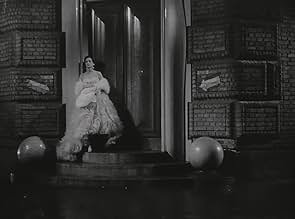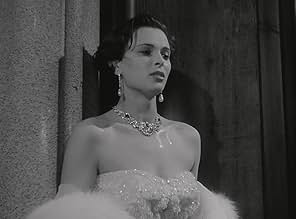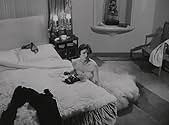CALIFICACIÓN DE IMDb
7.1/10
3.7 k
TU CALIFICACIÓN
Agrega una trama en tu idiomaPaola is a young, beautiful woman married to a wealthy entrepreneur. She meets her former lover Guido after seven years, but their relationship is marked by tragic events.Paola is a young, beautiful woman married to a wealthy entrepreneur. She meets her former lover Guido after seven years, but their relationship is marked by tragic events.Paola is a young, beautiful woman married to a wealthy entrepreneur. She meets her former lover Guido after seven years, but their relationship is marked by tragic events.
- Dirección
- Guionistas
- Elenco
- Premios
- 2 premios ganados y 1 nominación en total
Rubi Dalma
- L'amica snob di Paola
- (as Rubi D'Alma)
Rosi Mirafiore
- La cameriera del bar
- (as Rosi Mirafiori)
Franco Fabrizi
- Il presentatore della sfilata di moda
- (sin créditos)
Opiniones destacadas
The very first feature film of Michelangelo Antonioni, Story of a Love Affair as introduced by Lorenzo Codelli, was a film that dealt with the metaphysics, and had very little neo-realist elements which was a departure from what one would come to expect from a filmmaker whose documentaries were neo-realist. Watching it for the first time, I thought it would make a wonderful thriller/crime-mystery involving two lovers, and I suppose in the hands of Hollywood, we would get just that.
But this is not Hollywood we're talking about, so again I get to throw all standard notions I was weaned on out of the window. As I was warned by a friend, I would be in for a rough ride because whatever structure of story-telling I was familiar with was going to be challenged, and strangely enough, I am beginning to find this challenge quite liberating, like the hitting onto a goldmine or an oilfield, and just raking in the sights and sounds from how beautiful a black and white movie could be, in terms of story, and characters.
However, the characters need not be goody-two-shoes, or perfectly looking beings with zilch problems that they couldn't take care of within 2 hours. There are some serious and complex issues that the leads here have to grapple with, and together with an audience, we try and probe, and discover for ourselves just what those are, though naturally we aren't given all the answers on a sliver platter, and have to work hard at it, sometimes even utilizing some precious moments to breathe, digest, and compute, only being able to scratch the surface.
Whatever the story or mystery is, it never really got addressed, not directly anyway. But story aside, I was really intrigued by the lead characters. We have a beautiful married woman Paola Fontana (played by Lucia Bose whom we'll see later in another Antonioni movie, and at one time the reigning Miss Italy) who seem to have the best of what luxuries life can offer, but is stuck in a loveless marriage to a rich man Enrico (Ferdinando Sarmi). We're told that in her youth, she was a head turner, and almost always changes her boyfriends, each being the alpha-male type.
Surprisingly, her lover whom she maintains contact with, Guido (Massimo Girotti) is anything but an alpha-male type. In fact, I would call him a loser in the classic sense of the word. No real job and penniless, he has some magnetic qualities to be be able to mesmerize Paola into trysts in cheap motel rooms. Meeting on the sly, we see how a high society woman have to dodge around from being discovered, and setting up alibis just to meet Guido, and we soon learn how wicked a woman she can be, for coming up with plans for crime to be committed to get things done her way. Which brings us back to the original thought of how she was involved in a more heinous crime / accident, where she could well be the chief manipulator then made to be seen as the victim.
The main crime thread that got weaved into the story, was one involving a certain unseen Ms Giovanna, whose demise was linked to the two lovers. We never really learned what exactly happened, and Antonioni makes us work in order to try and piece clues and accounts together. And the probing of this mystery by a private investigator serves as a catalyst to the rest of the story, where we first see our lovers meet after a long while, but instead of enjoying each other's embrace, seem a lot more concerned with the PI's probe, as if afraid that it'll uncover hidden skeletons in their closets.
Story of a Love Affair becomes an examination into these 2 characters, and interesting enough, to dwell on the problems that they face, in a somewhat lose-lose situation throughout their relationship. The first was when Giovanna served to be in the way of their coming together, being an in-between, and when that's settled, there's the other more pressing issue of whether they can elope successfully, where pragmatism takes over romanticism with Guido knowing for sure that he has no money, and little means to support both of them, especially the lifestyle that Paola currently enjoys.
Definitely deserves a second viewing to try and develop my thoughts on it further! And to enjoy the beautiful score all over again too!
But this is not Hollywood we're talking about, so again I get to throw all standard notions I was weaned on out of the window. As I was warned by a friend, I would be in for a rough ride because whatever structure of story-telling I was familiar with was going to be challenged, and strangely enough, I am beginning to find this challenge quite liberating, like the hitting onto a goldmine or an oilfield, and just raking in the sights and sounds from how beautiful a black and white movie could be, in terms of story, and characters.
However, the characters need not be goody-two-shoes, or perfectly looking beings with zilch problems that they couldn't take care of within 2 hours. There are some serious and complex issues that the leads here have to grapple with, and together with an audience, we try and probe, and discover for ourselves just what those are, though naturally we aren't given all the answers on a sliver platter, and have to work hard at it, sometimes even utilizing some precious moments to breathe, digest, and compute, only being able to scratch the surface.
Whatever the story or mystery is, it never really got addressed, not directly anyway. But story aside, I was really intrigued by the lead characters. We have a beautiful married woman Paola Fontana (played by Lucia Bose whom we'll see later in another Antonioni movie, and at one time the reigning Miss Italy) who seem to have the best of what luxuries life can offer, but is stuck in a loveless marriage to a rich man Enrico (Ferdinando Sarmi). We're told that in her youth, she was a head turner, and almost always changes her boyfriends, each being the alpha-male type.
Surprisingly, her lover whom she maintains contact with, Guido (Massimo Girotti) is anything but an alpha-male type. In fact, I would call him a loser in the classic sense of the word. No real job and penniless, he has some magnetic qualities to be be able to mesmerize Paola into trysts in cheap motel rooms. Meeting on the sly, we see how a high society woman have to dodge around from being discovered, and setting up alibis just to meet Guido, and we soon learn how wicked a woman she can be, for coming up with plans for crime to be committed to get things done her way. Which brings us back to the original thought of how she was involved in a more heinous crime / accident, where she could well be the chief manipulator then made to be seen as the victim.
The main crime thread that got weaved into the story, was one involving a certain unseen Ms Giovanna, whose demise was linked to the two lovers. We never really learned what exactly happened, and Antonioni makes us work in order to try and piece clues and accounts together. And the probing of this mystery by a private investigator serves as a catalyst to the rest of the story, where we first see our lovers meet after a long while, but instead of enjoying each other's embrace, seem a lot more concerned with the PI's probe, as if afraid that it'll uncover hidden skeletons in their closets.
Story of a Love Affair becomes an examination into these 2 characters, and interesting enough, to dwell on the problems that they face, in a somewhat lose-lose situation throughout their relationship. The first was when Giovanna served to be in the way of their coming together, being an in-between, and when that's settled, there's the other more pressing issue of whether they can elope successfully, where pragmatism takes over romanticism with Guido knowing for sure that he has no money, and little means to support both of them, especially the lifestyle that Paola currently enjoys.
Definitely deserves a second viewing to try and develop my thoughts on it further! And to enjoy the beautiful score all over again too!
A rich older man's belated desire to investigate his beautiful wilful young wife' mysterious past reignites old passions with tragic consequences. For those viewers who are uncertain of Antonioni's capacity to make enjoyably great films, this may be a revelation especially if you have a penchant for post-WW2 film noir with its attendant malaise and melancholia. With suitable B&W photography and accompanying musical score and boasting one of the screen's great beauties, Lucia Bose, in her prime, this film is a masterpiece.
In Milano, when the wealthy and jealous entrepreneur Enrico Fontana (Ferdinando Sarmi) discovers hidden photos of his gorgeous twenty-seven year-old wife Paola Molon Fontana (Lucia Bosé), he hires a Neapolitan detective agency to investigate her past. Enrico, who owns twenty companies, married Paola during the war in March 1943 and her past is unknown to him. Detective Morale Carloni (Gino Rossi) is assigned by his boss to head to Ferrara, where Paola studied the technical school after leaving her hometown in Rovigo. During his investigation, the snoopy Carloni discovers that the teenager Paola dated many youngsters and her best friends were Matilda Calvani and Giovanna Carlini, who died seven years ago two days before her wedding with Guido (Massimo Girotti). He gets the address of Guido with Matilda's father but his wife sends a letter to Guido advising that the police was probing him. Guido travels to Milano, where he meets Paola after seven years to show the letter. When they see each other, their old passion reignites; but Carloni is still chasing the truth about the tragic accident with Giovanna.
"Cronaca di un Amore" is the first feature of the director Michelangelo Antonioni and his debut could not be better. This film noir has a magnificent cinematography in black and white and unusual and sophisticated angles of camera. The story is engaging, with the gorgeous nineteen year-old Lucia Bosé, who was Miss Italy 1947, in the role of a twenty-seven year-old fatal woman married with a rich industrial that left an old passion after a tragic accident and revives her love when they reunite seven years later. The romance is quite a comedy of errors, with the feeling of guilt of Paola and Guido affecting their love. Milano in the after war with few cars on the streets is also impressive. My vote is eight.
Title (Brazil): "Crimes d'Alma" ("Crimes of Soul")
"Cronaca di un Amore" is the first feature of the director Michelangelo Antonioni and his debut could not be better. This film noir has a magnificent cinematography in black and white and unusual and sophisticated angles of camera. The story is engaging, with the gorgeous nineteen year-old Lucia Bosé, who was Miss Italy 1947, in the role of a twenty-seven year-old fatal woman married with a rich industrial that left an old passion after a tragic accident and revives her love when they reunite seven years later. The romance is quite a comedy of errors, with the feeling of guilt of Paola and Guido affecting their love. Milano in the after war with few cars on the streets is also impressive. My vote is eight.
Title (Brazil): "Crimes d'Alma" ("Crimes of Soul")
Suffering is an inate response to life, this is one of the inescapable principles of existence. Antonioni saw far in the career that followed, farther than perhaps any director in cinema, but here he begins where it's proper, with life as a cycle of suffering, a seemingly random pattern of recurring time where we're denied what we most desire, happiness eludes us and our dreams and hopes are thwarted and frustrated.
Too young to see a true reality, Antonioni nonetheless sees clearly the reality of illusions. First that the cycle we call life is not blindly, randomly spun, and that we're to be held accountable for our part in the spinning, foremostly that our pursuit of happiness as we like to think is really the deluded pursuit of satisfying desire.
The crucial point that connects these is, rather poignantly, a death, and it happens not once but twice, mirrored identical the second time like a prefiguration of Vertigo. As with Vertigo, this borrows the world of film noir to speak of karmic wheels and the mechanisms that control them, a Double Indemnity scenario where secret lover and wife calculate to get rid of the rich husband.
In a magical touch, the plotted murder happens of its own accord, seemingly out of the whim of an agent of a higher court passing by.
It's not then just a matter of what begins as thought and desire invariably manifests in imminent reality, this is a powerful inspection of mind, but moreover that having devoted themselves by all means to the pursuit of that desire, a passion born of ego and craving, the obstacle that stood in their way now removed, the two protagonists realize how impotent they remain to pursue that desire, how desire is by its nature an insatiable attribute. Their punishment, which is not divine but of their own doing, is the toll exacted on their conscience.
This first appearance in Antonioni of karma as the force that keeps going the cycle of suffering is not perfect by any means, it seems at the same time to imply questions of moral order, whether or not for example wishing for a crime to happen is a crime in itself, spiritual in nature. And all of this is more verbose than need be, something Antonioni would excise in a few years.
We find things in this debut that Antonioni would elaborate upon in wonderful ways, the ineffability of connection, the city as a cold, alienating limbo where souls in transit struggle for meaning, the transparent reality that extends outside the frame to suggest an entire world and flow of life with or without these characters (indeed we find here, abetting this, the beginnings of his amazing sound work, where the city traffic is always audible), but all these are in nascent form here.
What stands out for me is the true perception that begins to form in Antonioni's cinema. Meaning our idea of reality is just that, an idea born of our own habits and various storytellings, which clouds our soul and needs to be challenged, dismantled, removed from our eyes so that we can see life as it is.
Too young to see a true reality, Antonioni nonetheless sees clearly the reality of illusions. First that the cycle we call life is not blindly, randomly spun, and that we're to be held accountable for our part in the spinning, foremostly that our pursuit of happiness as we like to think is really the deluded pursuit of satisfying desire.
The crucial point that connects these is, rather poignantly, a death, and it happens not once but twice, mirrored identical the second time like a prefiguration of Vertigo. As with Vertigo, this borrows the world of film noir to speak of karmic wheels and the mechanisms that control them, a Double Indemnity scenario where secret lover and wife calculate to get rid of the rich husband.
In a magical touch, the plotted murder happens of its own accord, seemingly out of the whim of an agent of a higher court passing by.
It's not then just a matter of what begins as thought and desire invariably manifests in imminent reality, this is a powerful inspection of mind, but moreover that having devoted themselves by all means to the pursuit of that desire, a passion born of ego and craving, the obstacle that stood in their way now removed, the two protagonists realize how impotent they remain to pursue that desire, how desire is by its nature an insatiable attribute. Their punishment, which is not divine but of their own doing, is the toll exacted on their conscience.
This first appearance in Antonioni of karma as the force that keeps going the cycle of suffering is not perfect by any means, it seems at the same time to imply questions of moral order, whether or not for example wishing for a crime to happen is a crime in itself, spiritual in nature. And all of this is more verbose than need be, something Antonioni would excise in a few years.
We find things in this debut that Antonioni would elaborate upon in wonderful ways, the ineffability of connection, the city as a cold, alienating limbo where souls in transit struggle for meaning, the transparent reality that extends outside the frame to suggest an entire world and flow of life with or without these characters (indeed we find here, abetting this, the beginnings of his amazing sound work, where the city traffic is always audible), but all these are in nascent form here.
What stands out for me is the true perception that begins to form in Antonioni's cinema. Meaning our idea of reality is just that, an idea born of our own habits and various storytellings, which clouds our soul and needs to be challenged, dismantled, removed from our eyes so that we can see life as it is.
This is Antonioni's first feature. Released in 1950, it seems to me both a harbinger of the auturer's mature style while also being a semi- remake, semi- rebuke of Double Indemnity., from only a few years prior. .
There is an extraordinary shot in this film, pure Antonioni, when the lovers meet on a bridge. The view is 360 degrees, we're not sympathizing with one lover more than the other. As the camera moves around its axis, our focus goes much beyond our traditionally intended targets as ship workers in the distance cohabitate the deepest focus with the characters we are following, who bicker over the merits of violating social morality.
If Double Indemnity is fatalistic, this work is nihilistic. If traditional Noir-narrative leads to certain doom, this story leads to only one finality, and that is the randomness and chaos of life, death and love. In that way, this work reminded me most of Woody Allen's late- career "thrillers"-Match Point and Cassandra's Dream.
There is an extraordinary shot in this film, pure Antonioni, when the lovers meet on a bridge. The view is 360 degrees, we're not sympathizing with one lover more than the other. As the camera moves around its axis, our focus goes much beyond our traditionally intended targets as ship workers in the distance cohabitate the deepest focus with the characters we are following, who bicker over the merits of violating social morality.
If Double Indemnity is fatalistic, this work is nihilistic. If traditional Noir-narrative leads to certain doom, this story leads to only one finality, and that is the randomness and chaos of life, death and love. In that way, this work reminded me most of Woody Allen's late- career "thrillers"-Match Point and Cassandra's Dream.
¿Sabías que…?
- TriviaMichelangelo Antonioni's feature film directorial debut. He wanted to cast Gene Tierney as Paola, but since he was an unknown European director he could not get her. Eventually he met then 19 year old Lucia Bosè, who had been Miss Italy 1947, while having lunch at fellow director Luchino Visconti's house. While initially skeptical over her maturity, Visconti convinced him to audition her.
- ErroresAfter Paola says, "Leave me alone," the camera moves to follow her as she collapses onto her bed. In the upper right corner of the frame, a white drape can be briefly seen before it is pulled out of the path of the camera.
- ConexionesFeatured in Marco Ferreri 1928 - 1997 (2008)
Selecciones populares
Inicia sesión para calificar y agrega a la lista de videos para obtener recomendaciones personalizadas
- How long is Story of a Love Affair?Con tecnología de Alexa
Detalles
Taquilla
- Total a nivel mundial
- USD 528
- Tiempo de ejecución1 hora 38 minutos
- Color
- Relación de aspecto
- 1.37 : 1
Contribuir a esta página
Sugiere una edición o agrega el contenido que falta

Principales brechas de datos
By what name was Cronaca di un amore (1950) officially released in India in English?
Responda

